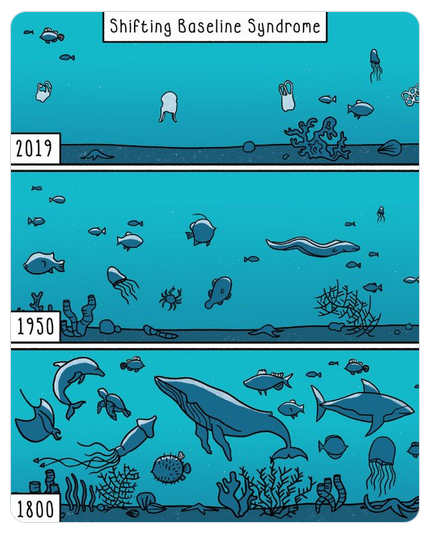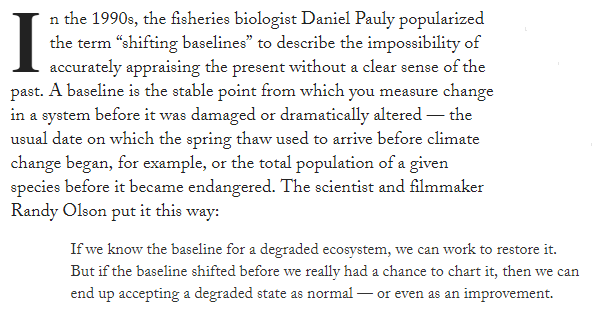File:Shifting Baseline Syndrome - threats to ecosystems biodiversity.png
Shifting_Baseline_Syndrome_-_threats_to_ecosystems_biodiversity.png (431 × 534 pixels, file size: 322 KB, MIME type: image/png)
Shifting Baseline Syndrome: Generational 'Amnesia'
Daniel Pauly explains 'Shifting Baselines" in a TED talk
Vanishing Fish: Shifting Baselines and the Future of Global Fisheries
- by Daniel Pauly / May 2019
Daniel Pauly and George Monbiot in conversation about “shifting baselines syndrome”
○
More about Shifting Baselines -- and the Work of Dan Pauly
🌎
Earth.org
What is Shifting Baseline Syndrome?
Coined by Daniel Pauly in 1995, while speaking of increasing tolerance to fish stock declines over generations, SBS also has roots in psychology, where it is referred to as ‘environmental generational amnesia’. Simply put, Shifting Baseline Syndrome is ‘a gradual change in the accepted norms for the condition of the natural environment due to a lack of experience, memory and/or knowledge of its past condition’. In this sense, what we consider to be a healthy environment now, past generations would consider to be degraded, and what we judge to be degraded now, the next generation will consider to be healthy or ‘normal’. As Soga and Gaston (2018) argue, without memory, knowledge, or experience of past environmental conditions, current generations cannot perceive how much their environment has changed because they are comparing it to their own ‘normal’ baseline and not to historical baselines.
○
Frontiers in Ecology and the Environment
Shifting baseline syndrome: causes, consequences
With ongoing environmental degradation at local, regional, and global scales, people's accepted thresholds for environmental conditions are continually being lowered. In the absence of past information or experience with historical conditions, members of each new generation accept the situation in which they were raised as being normal. This psychological and sociological phenomenon is termed shifting baseline syndrome (SBS), which is increasingly recognized as one of the fundamental obstacles to addressing a wide range of today's global environmental issues.
○
Permaculture Research Institute
Shifting Baseline Syndrome
Shifting baseline syndrome is a scientific term for a phenomenon that affects almost every branch of life, but it’s particularly important for those with an interest in permaculture, or those who are wondering why exactly permaculture is so important. While it may seem a bit of a complex term, or one that you’d rather leave to those with a more “technical” job, shifting baseline syndrome is a psychological construct that every individual needs to know.
To put it in its most simplest terms, shifting baseline syndrome is basically the way in which humans, and every generation essentially, lowers its standards over the course of time. These generations are not lowering their standards on purpose, or because they have any negative goal, but simply because they don’t know any better. It all occurs underneath the surface level, with most completely unaware of what’s happening. New generations assume the lack of quality that they’ve become used to is simply normal, and so they no longer see the extreme damage (to just about anything, be it the environment or anything else that’s declined over the ages) that someone from, say, five generations prior would be absolutely taken aback by. Expectations are lowered almost subconsciously, and so the damage to the environment keeps occurring on a broader and broader scale, as damage occurs so slowly that no one even sees it, unless they were to step back and look at things over the course of multiple generations.
○
Axios Future
"Shifting baselines" are changing what normal means
Why it matters: What we think of as normal in life — whether in climate, politics or society — is always changing due to what's known as the "shifting baselines syndrome." Because we often miss those changes, we end up with a warped image of the present that shapes our policies and our future.
What's happening: This spring the National Oceanic and Atmospheric Administration will update its calculation of average temperatures and precipitation.
"Normal" high and low temperatures and precipitation — the figures you might see on a daily weather report — are drawn from weather data over a 30-year period, a practice that has been maintained for over a century.
Every decade forecasters shift to a newer 30-year data set. Over the past decade that meant 1981–2010, but beginning this year averages will be calculated from 1991–2020.
Because 1991–2020 was warmer than 1981–2010 in nearly every part of the U.S., the update means what we classify as normal temperatures now will actually be higher than just a year ago, because the baseline for what's considered normal has shifted.
🌎
More on Data, Intelligence, Science @GreenPolicy360
GreenPolicy360, Our Policy on Science
🌎
More on Observational Earth Science and Shifting Baselines
- Measuring Changes in Earth's Ecosystems Over Time
- "Data Sets / Trendlines and Shifting Baselines"
In the 1990s, the fisheries biologist Daniel Pauly popularized the term “shifting baselines” to describe the impossibility of accurately appraising the present without a clear sense of the past.
🌎
File history
Click on a date/time to view the file as it appeared at that time.
| Date/Time | Thumbnail | Dimensions | User | Comment | |
|---|---|---|---|---|---|
| current | 13:35, 31 January 2023 |  | 431 × 534 (322 KB) | Siterunner (talk | contribs) |
You cannot overwrite this file.
File usage
The following 11 pages use this file:
- All Species Day
- Climate Change - Global Warming Keyword-Terms
- Extinction
- Global Fishing Watch
- File:About Baselines and Change.png
- File:California's kelp forests and coastal biodiversity diminished.png
- File:Shifting Baselines 2.jpg
- Category:Biodiversity
- Category:Ecology Studies
- Category:Ocean Sustainability
- Category:Oceans
- Anthropocene
- Biodiversity
- Biogeosciences
- Bioneers
- Biosphere
- Citizen Science
- Climate Change
- Climate Policy
- Eco-ethics
- Ecology Studies
- Ecoregions
- Earth
- Earth Law
- Earth Imaging
- Earth Observations
- EarthPOV
- Earth Science
- Earth Science from Space
- Earth System Science
- Environmental Laws
- Environmental Security, National Security
- ESA
- EOS eco Operating System
- Fisheries
- Forests
- Global Security
- Global Warming
- Green Best Practices
- Green Graphics
- Green Politics
- Health
- Microbiology
- Microorganism
- NASA
- Natural Resources
- Natural Rights
- Nature
- New Definitions of National Security
- NOAA
- Ocean Ecosystem
- Oceans
- Ocean Science
- Ocean Sustainability
- Permaculture
- Planet API
- Planet Citizen
- Planet Citizens
- Planet Scientist
- Planet Citizens, Planet Scientists
- Resilience
- Sea-Level Rise & Mitigation
- Seventh Generation Sustainability
- Strategic Demands
- Sustainability
- Sustainability Policies
- Watersheds
- Water Quality
- Wetlands
- Whole Earth
- Wildlife
- Zoology

